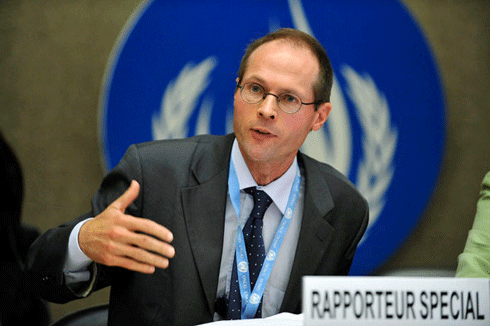
|
Published: 5 June 2012
Concern over SE Asian agrofuel developments
Two UN experts have urged caution on the food-security and human rights implications of large international agrofuel developments in South East Asia.
‘Governments must not be seduced by the promises of developers when assessing large-scale land acquisitions for export-led crops and agrofuel production,’ say the UN Special Rapporteur on the right to food, Dr Olivier De Schutter, and the UN Special Rapporteur on the rights of indigenous peoples, Professor James Anaya.
There is rapid expansion of agrofuel developments in South-East Asia. According to the rapporteurs, moves to convert 1–2 million hectares of rainforest and small-scale farming plots to an export-led crop and agrofuel plantation in the Merauke region of Indonesia could affect the food security of 50,000 people.
In another example referred to by the rapporteurs some 3000 hectares of so-called ‘idle’ land has been converted to sugar cane for agrofuel production in the Isabela region of the Philippines, with a further 8,000 hectares due to be added, meaning a major land transformation and uncertain impacts for the municipality’s 45,000 inhabitants.
‘Large-scale monocrop developments mean a wholesale shift in land use and land access,’ warns Dr Schutter, noting that the benefits of these projects accrue principally to multinational firms who export agrofuels or food crops to international markets.
‘All too often, this is to the detriment of existing land users. If the environment they depend upon is repurposed, degraded and placed off limits, their ability to produce or to procure food – and thus their right to food – will be severely threatened,’ says De Schutter.
‘These are mostly indigenous families whose traditional livelihoods are rooted in their local environment,’ Prof. Anaya warns.
‘Communities are often ancestrally tied to the areas in question and may not possess official deeds to the land, making their tenure highly vulnerable in the face of land conversion deals.’
The UN experts expressed concerns about an apparent lack of adequate consultation and transparency in the land acquisition processes associated with the two developments in Indonesia and the Philippines noted above. In neither case are indigenous communities believed to have been sufficiently informed and consulted about the land acquisitions and their repercussions on local life.
Both experts urge the South-East Asian Governments ‘to align – as a matter of urgency – their biofuels and investment policies with the need to respect land users’ rights, as detailed in the voluntary guidelines on land tenure recently adopted by member States of the Committee on World Food Security.
Source: UN Special Rapporteur on the Right to Food




